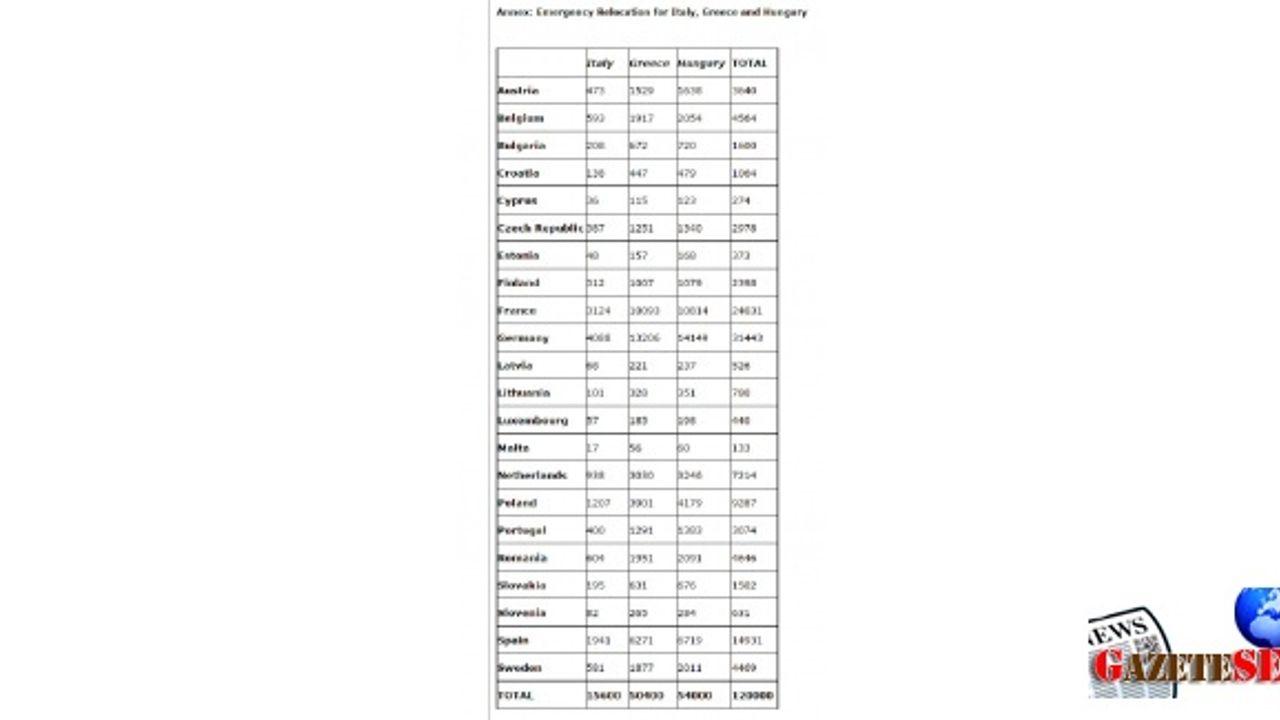Öykü Altuntaş / Istanbul, Sep 16 () - European Commission announced a comprehensive package of proposals that could help addressing the refugee crisis, declaring the most decisive action, having been delivering the crisis on the European Agenda in the last years.
The press report released by European Commission on Sep. 9 suggested a comprehensive action plan which could help address the refugee crisis that European Union (EU) Member States and neighbouring countries have been facing, including by tackling the root reasons which make people seek refuge in Europe.
The new set of measures offered by European Commission targets to alleviate pressure from the member states most affected – notably Greece, Italy and Hungary.
The package proposes these countries to relocate 120,000 people in clear need of international protection to other EU Member States.
The measures are expected to help member states with handling the growing number of asylum applications, by enabling a swifter processing, through a common European list of safe countries of origin.
The Commission’s package outlined the main actions for making return policy more effective and has proposed a 1.8 billion euros Trust Fund to help tackle the root causes for migration in Africa.
The concrete measures to respond to the current refugee crisis and to prepare for future challenges were detailed as follows:
1. An emergency relocation proposal for 120,000 refugees from Greece, Hungary and Italy:
Following the sharp increase in illegal border crossings in the Central and Eastern Mediterranean, but also on the Western Balkans route, over the last few months, urgent action is needed. The Commission proposes to relocate 120,000 people in clear need of international protection from Italy (15,600),Greece (50,400) and Hungary (54,000).
The relocation would be done according to a mandatory distribution key using objective and quantifiable criteria (40% of the size of the population, 40% of the GDP, 10% of the average number of past asylum applications, 10% of the unemployment rate).
It applies to nationalities of applicants with an EU-wide average recognition rate of 75% or higher[1]. This comes in addition to the Commission’s proposal from May to relocate 40.000 people in clear need of international protection from Italy and Greece to other EU Member States, thus bringing the total proposed number up to 160,000.
The relocation will be accompanied by €780 million EU budget support for participating Member States, including a 50% pre-financing rate to ensure that governments on national, regional and local level have the means to act very swiftly.
2. A Permanent Relocation Mechanism for all Member States:
As announced in the European Agenda on Migration, the Commission is proposing a structured solidarity mechanism which can be triggered any time by the Commission to help any EU-Member State experiencing a crisis situation.
3. A common European list of Safe Countries of Origin:
Following up on the European Agenda on Migration and the European Council Conclusions of 25-26 June, the European Commission is proposing a Regulation to establish an EU common list of safe countries of origin.
Such a European list will allow for swifter processing of individual asylum applications from candidates originating from countries considered to be safe across the EU, and for faster returns if the individual assessments of the applications confirm no right of asylum.
The Commission proposes to add Albania, Bosnia and Herzegovina, the former Yugoslav Republic of Macedonia, Kosovo, Montenegro, Serbia and Turkey to the EU list of safe countries of origin.
4. Making return policy more effective:
The Commision will attempt to improve the return policies of Member States, the Commission has issued a common Return Handbook and an EU Action Plan on Return.
The Commission has presented an EU Action Plan on Return which defines the immediate and mid-term measures to be taken by Member States to enhance voluntary return, to strengthen the implementation of the Return Directive, to improve information sharing, to strengthen the role and mandate of Frontex in return operations, and to create an integrated system of return management.
5. Communication on Public Procurement rules for Refugee Support Measures:
Member States have to satisfy adequately and speedily the most immediate needs of asylum seekers for housing, supplies and services. Today's Communication provides guidance for national, regional and local authorities on how to ensure compliance with EU law while procuring these services in a simple, speedy and non-bureaucratic manner.
6. Addressing the external dimension of the refugee crisis:
Renewed efforts are being devoted to support diplomatic initiatives and find political solutions to the conflicts in Syria, Iraq, and Libya. The EU is providing assistance to the population in Syria – in particularly to internally displaced person - and financial support to neighbouring countries hosting the highest number of refugees from Syria, such as Jordan, Lebanon, Turkey.
7. A Trust Fund for Africa:
Today, the European Commission has allocated €1.8 billion from the EU's financial means to set up an 'Emergency Trust Fund for stability and addressing root causes of irregular migration in Africa'. It will support these regions to develop better socio-economic opportunities and migration management policies.
The flip side to showing solidarity with frontline Member States is also that everyone must show responsibility in applying the common EU rules. To this end, the Commission is also this week stepping up infringement procedures where necessary to enforce the rules and is implementing a 'HotSpot' approach in frontline Member States to assist them in applying common EU asylum rules.
(Table)




















